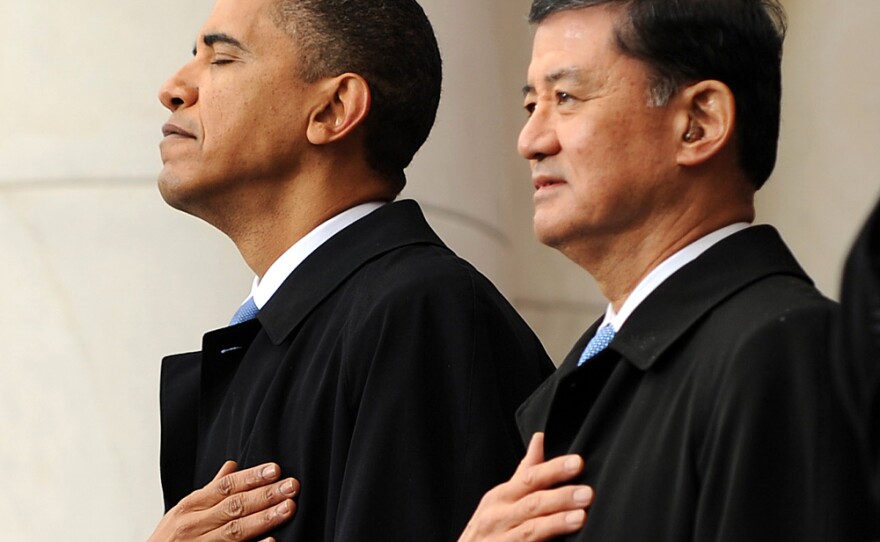In his first nine months as head of the Department of Veterans Affairs, retired Gen. Eric Shinseki has spent hours just listening to veterans talk. Shinseki tells NPR's Steve Inskeep that he feels a strong obligation to "give back" to the men and women he once served with.
Last week, Shinseki spoke to a group of young veterans attending college. A former Army chief of staff who was wounded during his service in Vietnam, Shinseki asked the veterans if any of them suffered from post-traumatic stress.
He got only silence — so Shinseki asked about symptoms.
"How many of you have a little trouble sleeping at night?" he asked the students, many of whom had been in combat.
The general then asked them if they were overly vigilant for threats in their own homes, or if any of them had been having anger management problems.
"And then hands go up," Shinseki said. "And they looked at each other, and they suddenly realize they're not the only ones in it."
Since 2001, more than 1 million new veterans have come into a system that is being stretched thin. And one thing they'll need a lot of help with is their own peace of mind.
In particular, Shinseki has been concerned with what he calls "resilience." Shinseki, a former engineering student, describes what happens when a ball is suspended in air and then dropped.
The ball will bounce, he said — but it will not rise to the same height from which it was dropped. And if the ball continues to bounce, it progressively gets lower and lower.
"This also describes the multiple deployments" that American soldiers have experienced in the past eight years on tours of duty in Iraq and Afghanistan, Shinseki said. "Quality of resilience is affected."
Inskeep then asked if — given the large scale of the problems posed by post-traumatic stress and other mental injuries — Shinseki sees the problem being "fully addressed and fully resourced" by the VA.
"I think we're better at addressing and resourcing it," said Shinseki. "I don't know what 'fully' is right now. I can't quantify the size of the challenge."
Shinseki said that he is reaching out to the Department of Defense and trying to create a computer-driven system that will track service personnel through their careers — including when they become veterans. The idea, he said, is to use automatic enrollment to create VA health records for service members when they join the military.
"So when the uniform comes off, we have all the evidence we need to make faster, better, smarter adjudications," Shinseki said.
The scope of that project is huge — and it will likely take some time to implement.
"I remind folks around here [that] the average life of a secretary of veterans affairs is three years," Shinseki said. "So, I'd better get moving."
Copyright 2022 NPR. To see more, visit https://www.npr.org. 9(MDAzMjM2NDYzMDEyMzc1Njk5NjAxNzY3OQ001))






